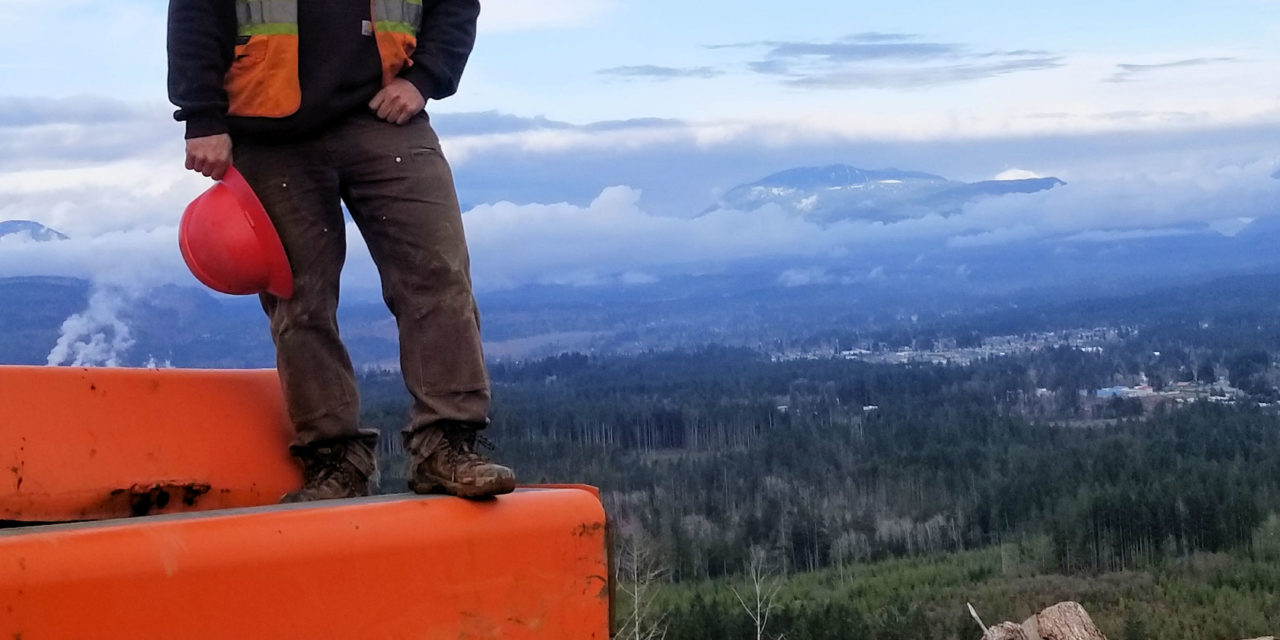PORT ALBERNI – Other people see a slash pile. Brad Berry sees a viable product, a vision that cuts the smoke from logging and gives Port Alberni’s Paper Excellence mill a new clean-burning fuel.
For 14 years B. Berry Enterprises Ltd. has refined its harvesting and re-use of post-harvest logging wood waste. Traditionally, the unmarketable wood and brush was collected into large piles and burned, filling the sky with smoke.
When Brad Berry started in 1988 with family business JW Berry Trucking, he participated in the building of burn piles and sending the waste up in smoke.
The logging sites needed to be cleared to reduce provincial fire hazard and allow reforestation. But he saw the downside. “It generated a lot of smoke in the community. It also wasted a lot of fibre.”
Once he saw the waste as fibre, he started researching. The small logs and brush couldn’t be used for dimensional timber but there were other options. In 2006 he formed his company and spent two years researching processing and finding markets.
Starting in 2008 he implemented his solution, which was to grind wood waste into hog fuel and deliver it to Paper Excellence (Catalyst Paper) to fire the pulp mill’s steam boilers. Using what was once waste was a win-win: no smoke pollution, material is utilized, and Paper Excellence consumed less natural gas.
B.Berry Enterprises now has contracts with multiple coastal logging companies to de-activate logging roads and clear logged land to allow reforestation. Among his clients are City of Port Alberni, Mosaic, Huu Ay Aht, and Tseshaht First Nations, Probyn Log, San Group and Western Forest Products.
His approach allows reforestation to start sooner. Traditional slash burning forced tree planting crews to wait for fires to go out and the ground to cool before they could start planting seedlings.
When the slash is being collected and re-used, there is no delay. Sometimes Brad’s team is on the ground collecting and grinding fibre in one sector and overseeing the tree planters working in the adjoining sector.
“We collect and re-use 153,000 tons of green waste every year,” Brad said.
To make his system work, Brad had to solve multiple challenges. One of them was getting vehicles to the logging sites along narrow, winding, and often steep roads. Trailer trucks couldn’t make the grades.
Brad’s solution was large bins on smaller, more agile roll-off trucks. The custom-made combo could reach the logging sites, drop the bins for loading, and then pick up.
Brad continually seeks more sources to expand his environmentally friendly business: “I began actively pursuing waste wood left by logging and also seeking more ways to recycle more types of wood.”
For example, the company added a land clearing service. The marketable logs removed and sold, then the remaining brush is chipped or ground for re-use. “We would leave the clients site clean.”
They also tackle demolition projects and re-use of wood from derelict buildings and boats. “It is all fibre and I’m looking for the fibre.”
In addition to the hog fuel, Brad’s team produces wood chips that can be used by the mill for pulp. They produce garden mulch, separated by species into Douglas Fir, Cedar, and Hemlock.
Brad is now developing a machine to process residual wood into firewood for resale. He expects it to be ready soon and already has firewood orders. In addition to his chipper and grinder, his company also uses forestry excavators, skidders, logging trucks, and the trucks with roll-off bins. Some can be seen in action at bberryenterprises.com.
This equipment doesn’t sit idle. In the off-season B. Berry Enterprises does stream restoration to enhance fish stocks for Fisheries. He notes his seven-member crew is versatile enough to tackle any challenge.
“Without the very hard working crew that I have, I couldn’t do as much as I do. I owe a lot of thanks to my crew and my clients.”

